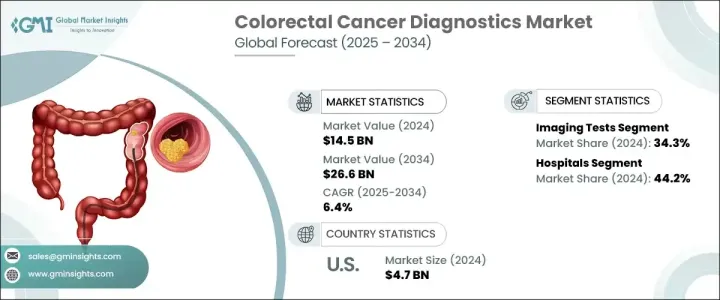
세계의 대장암 진단 시장 규모는 2024년에 145억 달러를 달성하였고 CAGR 6.4%로 성장하여 2034년에는 266억 달러에 이를 것으로 추정됩니다.

시장 성장의 원동력은 대장암의 이환율 증가, 조기 스크리닝을 위한 공중 보건 이니셔티브의 개선, 진단 모달리티에 대한 지속적인 기술 진보를 들 수 있습니다.
| 시장 범위 | |
|---|---|
| 시작 연도 | 2024년 |
| 예측 연도 | 2025-2034년 |
| 시작 금액 | 145억 달러 |
| 예측 금액 | 266억 달러 |
| CAGR | 6.4% |
정기적인 CRC 검진의 권장 연령을 45세로 낮추는 등 계발 캠페인이나 검진 가이드라인의 개선이 진행되면서 조기 진단률 향상에 기여하고 있습니다. 앉아서 생활하는 라이프스타일이나 식습관과 같은 생활 습관의 요인이 더해져 세계적으로 대장암에 대한 부담이 증가하고 있어 효과적이고 이용하기 쉬운 진단법의 필요성이 부각되고 있습니다. 세계 정부 및 의료기관이 대장암 검진에 대한 접근성을 개선하기 위한 대규모 이니셔티브를 시작하는 한편 비공개회사는 차세대 진단 툴을 시장에 투입하기 위해 연구 개발에 많은 투자를 하고 있습니다.
대장암 진단 시장은 주로 검사 유형별로 구분되며, 이미지 검사 부문이 2024년에 34.3%의 점유율을 차지하였습니다. AI를 활용한 영상 진단의 채용에 의해 검출 정밀도가 향상하여 전암 병변의 조기 발견에 도움이 되고 있습니다. 또한, 영상 검사는 비침습성 또는 저침습성이므로 환자의 수용도와 검진율이 향상되고 있습니다.
최종 사용자별로는 병원 부문이 2024년에 44.2%의 점유율을 차지하면서 대장암 진단의 주요 최종 사용자로서의 지위를 굳히고 있습니다. 병원 부문은 외과 종양학 유닛 등을 포함한 종합적인 진단 인프라에 의해 지원되고 있습니다.
북미 대장암 진단 시장은 2024년에 35.2%의 점유율을 차지했으며 이는 마커 검사 등의 고도 진단 기술의 높은 채용율에 기인합니다.
Abbott Laboratories, Exact Sciences Corporation, Siemens Healthineers AG, Guardant Health Inc., F-Hoffmann-La Roche Ltd., GE HealthCare Technologies, Inc.와 같은 주요 시장 기업은 액체 생검, AI 주도 영상 진단, 분자 진단 혁신을 통해 진단 포트폴리오 확대에 많은 투자를 하고 있습니다.
The Global Colorectal Cancer Diagnostics Market was valued at USD 14.5 billion in 2024 and is estimated to grow at a CAGR of 6.4% to reach USD 26.6 billion by 2034.

The market growth is driven by the increasing incidence of colorectal cancer, rising public health initiatives for early screening, and continuous technological advancements in diagnostic modalities. Innovations such as liquid biopsy, AI-assisted imaging, and stool-based DNA tests are reshaping the landscape of colorectal cancer detection, offering less invasive, more accurate, and patient-friendly diagnostic options.
| Market Scope | |
|---|---|
| Start Year | 2024 |
| Forecast Year | 2025-2034 |
| Start Value | $14.5 Billion |
| Forecast Value | $26.6 Billion |
| CAGR | 6.4% |
Growing awareness campaigns and updated screening guidelines, such as lowering the recommended age for routine CRC screening to 45, contribute to early diagnosis rates. Furthermore, an aging global population, combined with lifestyle factors like sedentary behavior and dietary habits, has heightened the global burden of colorectal cancer, underscoring the urgent need for effective and accessible diagnostics. Governments and healthcare organizations worldwide are launching large-scale initiatives to improve access to colorectal cancer screening, while private companies are investing heavily in R&D to bring next-generation diagnostic tools to the market. Artificial intelligence, next-generation sequencing (NGS), and microfluidic technologies are poised to enhance diagnostic precision and patient outcomes significantly.
The colorectal cancer diagnostics market is primarily segmented by test type, with the imaging tests segment holding 34.3% share in 2024. Imaging modalities such as CT colonography, MRI, and PET scans remain crucial for early detection, staging, and treatment planning. Adopting AI-enhanced imaging has improved detection accuracy, helping to identify precancerous lesions at earlier stages. Moreover, imaging tests' non-invasive or minimally invasive nature continues to drive patient acceptance and screening rates.
In terms of end-use, the hospitals segment held 44.2% share in 2024, solidifying its position as the leading end-user for colorectal cancer diagnostics. Hospitals are the primary centers for colorectal cancer detection, diagnosis, staging, and treatment planning, supported by a comprehensive diagnostic infrastructure that includes advanced imaging systems, molecular pathology labs, endoscopic equipment, and surgical oncology units. Their multidisciplinary approach-bringing together oncologists, radiologists, pathologists, gastroenterologists, and surgeons-enables the seamless coordination of care for colorectal cancer patients, from early detection through post-treatment monitoring.
North America Colorectal Cancer Diagnostics Market held a 35.2% share in 2024. The region's dominance stems from a robust healthcare infrastructure, widespread implementation of screening programs, and high adoption rates of advanced diagnostic technologies, such as AI-enabled colonoscopy, liquid biopsies, and molecular biomarker testing. In the United States, initiatives like the Colorectal Cancer Control Program (CRCCP) by the CDC have been instrumental in increasing early screening rates, particularly among underserved populations.
Key market players such as Abbott Laboratories, Exact Sciences Corporation, Siemens Healthineers AG, Guardant Health Inc., F-Hoffmann-La Roche Ltd., and GE HealthCare Technologies, Inc. are heavily investing in expanding their diagnostic portfolios through innovations in liquid biopsy, AI-driven imaging, and molecular diagnostics. Strategic partnerships, mergers and acquisitions, and regulatory approvals for new products remain crucial strategies for these players to strengthen their global presence and drive future market growth.